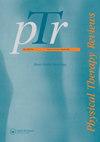在骨科和神经康复的运动输送中的人体工程学考虑:一个系统的回顾方案
IF 0.8
Q4 REHABILITATION
引用次数: 0
摘要
摘要背景运动游戏(锻炼和游戏)在康复环境中已经越来越流行,以帮助个人发展、维持和恢复最大的身体运动和身体功能。然而,人们对与运动游戏相关的受伤风险缺乏关注。尽管有报道称使用这种干预措施可能会对患者造成伤害,但在康复过程中,人体工程学仍未得到重视或考虑。目的本综述的主要目的是确定康复中运动游戏的人体工程学考虑因素。第二个目的是从收集和评估的文献中回顾神经和骨科患者运动锻炼结果中使用的结果指标。方法本研究将采用系统回顾设计,通过仅使用随机对照试验研究,确定神经和骨科患者在运动锻炼和康复过程中的工效学考虑因素和结果测量。牛津大学循证医学中心将用于评估所选文章的可靠性和有效性,Mendeley软件、Rayyan QCRI应用程序和电子表格软件将用于纳入、批判性评估和数据收集过程,以确保客观性。系统评价的首选报告项目(PRISMA)将用于研究获取和选择过程的可视化。提取的数据将进行分析,然后确定所审查研究中使用的人体工程学考虑因素和结果测量。本文章由计算机程序翻译,如有差异,请以英文原文为准。
Ergonomic considerations in exergaming delivery in orthopedic and neurologic rehabilitation: a systematic review protocol
Abstract Background The increasing popularity of exergaming (exercise and gaming) has already emerged in the rehabilitation setting to help individuals develop, maintain, and restore maximum body movement and physical function. However, there is a lack of attention to the risk of sustaining injuries associated with exergaming. While there are reports of potential harm or injuries for patients using this intervention, ergonomics has still not been given attention or consideration in the deliverance of exergaming during rehabilitation. Objectives The primary aim of this review is to identify the ergonomic considerations in the delivery of exergaming in rehabilitation. The secondary aim is to review the outcome measures used in the results of exergaming to patients with neurologic and orthopedic conditions from the literature gathered and appraised. Methods The study will use a systematic review design to identify the ergonomic considerations and outcome measures in the delivery of exergaming and rehabilitation of neurologic and orthopedic patients by using only randomized controlled trial studies. Centre for Evidence-based Medicine of Oxford University will be used to appraise the reliability and validity of the chosen article and the Mendeley software, Rayyan QCRI application, and a spreadsheet software will be used in the inclusion, critical appraisal, and data gathering process to ensure objectivity. Preferred Reporting Items for Systematic Reviews (PRISMA) will be provided for visualization of the study acquisition and selection process. The extracted data will undergo analysis and will then determine the ergonomic considerations and outcome measures utilized in the studies reviewed.
求助全文
通过发布文献求助,成功后即可免费获取论文全文。
去求助
来源期刊

Physical Therapy Reviews
REHABILITATION-
CiteScore
1.30
自引率
0.00%
发文量
26
期刊介绍:
Physical Therapy Reviews is an international journal which aims to publish contemporary reviews, discussion papers and editorials within physical therapy, and in those basic and clinical sciences which are the basis of physical therapy. The journal is aimed at all those involved in research, teaching and practice within the area of physical therapy. Reviews (both descriptive and systematic) are invited in the following areas, which reflect the breadth and diversity of practice within physical therapy: •neurological rehabilitation •movement and exercise •orthopaedics and rheumatology •manual therapy and massage •sports medicine •measurement •chest physiotherapy •electrotherapeutics •obstetrics and gynaecology •complementary therapies •professional issues •musculoskeletal rehabilitation
 求助内容:
求助内容: 应助结果提醒方式:
应助结果提醒方式:


